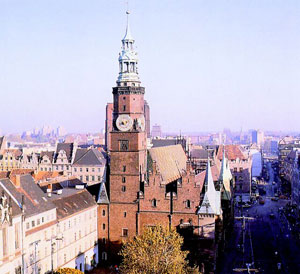|
Wrocław is the largest city in the historic region of Silesia, a rich agricultural and mining area in southwestern Poland. It is located on the Odra River, which links the city with the Baltic Sea.
Wroclaw (formerly Breslau), is one of Poland's largest cities (pop 637,200), the major city in Silesia, and an important commercial, transportation, and industrial center. The city is linked with the Baltic Sea and the Elbe-Wisła network of inland waterways. It has extensive trade in wool, grain, iron and other metals, as well as coal. Industrial establishments include iron foundries, breweries, textile mills, flour mills, and plants engaged in the manufacture of machinery, locomotives, railway cars, furniture, jewelry, musical instruments, distilled liquors, and cigars.
| |
 |
The site of Wroclaw lies on both sides of the Odra river, and bridges connect the two sections of the city. The principal section, on the western bank, centers around the so-called Inner Town, much of which dates from medieval times. Eastern Wroclaw, the modern section of the city, is well planned and mainly residential. In the Inner Town are several noteworthy ecclesiastical edifices, particularly the Roman Catholic cathedral of Saint John the Baptist (begun in 1158 and the oldest church in the city); the Church of Saint Elizabeth (13th century); the Church of the Holy Cross (13th-14th century); and the Church of Our Lady of the Sand (14th century). The most interesting secular edifice in Wroclaw is the Rathaus (town hall), dating from the 13th century and rebuilt in the 15th century in the Gothic architectural style. Other important structures are the former royal palace, several government buildings, the Museum of Fine Arts, and the buildings of the University of Wroclaw (1702). Originally a Jesuit college, the university, which was rebuilt in 1945, maintains a famous library, an art gallery, and an astronomical observatory. The city also has a technical university.
Known originally as Vratislavia, Wroclaw figured in Poland's recorded history as early as 1000. It was made an episcopal see during the 11th century. On the formation of the duchy of Silesia in 1163 the town became the ducal capital. During the 13th century, many Germans settled in the area, and the town acquired its German name, Breslau, in 1261. A prosperous mercantile center, it joined the federation known as the Hanseatic League in 1294. Bohemia acquired Breslau in 1335. Through the accession of the Spanish prince Ferdinand I to the Bohemian throne in 1526, it became a Habsburg possession.
Breslau was seized by Prussia in 1741 during the War of the Austrian Succession. It subsequently was made the capital of the Prussian province of Lower Silesia. Except for a few brief periods of military occupation, notably during the Napoleonic Wars, Breslau remained a part of Prussian Silesia until its capture in World War II by Soviet troops in May 1945. After the collapse of Germany, the city, which had suffered heavy damage during the war, reverted to Poland by decision of the Potsdam Conference and was renamed Wroclaw. Its German population was subsequently deported and largely replaced by Polish settlers.
The 6th European Champions' Cup will be hosted and accommodated at the Radisson SAS Hotel. The hotel is rated as '5 stars' and has arranged a special full board rate for the participants and their accompanying guests.
Room reservations should be made through the Reservation Form which also contains useful information. Click here to download the form in pdf format. |


